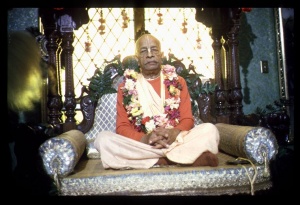CC Madhya 8.300: Difference between revisions
No edit summary |
(Vanibot #0054 edit - transform synonyms into clickable links, which search similar occurrences) |
||
| Line 17: | Line 17: | ||
<div class="synonyms"> | <div class="synonyms"> | ||
''prātaḥ-kāle'' | ''[//vanipedia.org/wiki/Special:VaniSearch?s=prātaḥ&tab=syno_o&ds=1 prātaḥ]-[//vanipedia.org/wiki/Special:VaniSearch?s=kāle&tab=syno_o&ds=1 kāle]'' — in the morning; ''[//vanipedia.org/wiki/Special:VaniSearch?s=uṭhi’&tab=syno_o&ds=1 uṭhi’]'' — rising; ''[//vanipedia.org/wiki/Special:VaniSearch?s=prabhu&tab=syno_o&ds=1 prabhu]'' — Lord Śrī Caitanya Mahāprabhu; ''[//vanipedia.org/wiki/Special:VaniSearch?s=dekhi’&tab=syno_o&ds=1 dekhi’]'' — visiting; ''[//vanipedia.org/wiki/Special:VaniSearch?s=hanumān&tab=syno_o&ds=1 hanumān]'' — the village deity Hanumān; ''[//vanipedia.org/wiki/Special:VaniSearch?s=tāṅre&tab=syno_o&ds=1 tāṅre]'' — unto him; ''[//vanipedia.org/wiki/Special:VaniSearch?s=namaskari’&tab=syno_o&ds=1 namaskari’]'' — offering obeisances; ''[//vanipedia.org/wiki/Special:VaniSearch?s=prabhu&tab=syno_o&ds=1 prabhu]'' — Śrī Caitanya Mahāprabhu; ''[//vanipedia.org/wiki/Special:VaniSearch?s=dakṣiṇe&tab=syno_o&ds=1 dakṣiṇe]'' — to the south; ''[//vanipedia.org/wiki/Special:VaniSearch?s=karilā&tab=syno_o&ds=1 karilā]'' — made; ''[//vanipedia.org/wiki/Special:VaniSearch?s=prayāṇa&tab=syno_o&ds=1 prayāṇa]'' — departure. | ||
</div> | </div> | ||
Latest revision as of 23:58, 19 February 2024

A.C. Bhaktivedanta Swami Prabhupada
TEXT 300
- prātaḥ-kāle uṭhi’ prabhu dekhi’ hanumān
- tāṅre namaskari’ prabhu dakṣiṇe karilā prayāṇa
SYNONYMS
prātaḥ-kāle — in the morning; uṭhi’ — rising; prabhu — Lord Śrī Caitanya Mahāprabhu; dekhi’ — visiting; hanumān — the village deity Hanumān; tāṅre — unto him; namaskari’ — offering obeisances; prabhu — Śrī Caitanya Mahāprabhu; dakṣiṇe — to the south; karilā — made; prayāṇa — departure.
TRANSLATION
After rising from bed the next morning, Śrī Caitanya Mahāprabhu visited the local temple, where there was a deity of Hanumān. After offering him obeisances, the Lord departed for South India.
PURPORT
In almost all the cities and towns of India there are temples of Hanumānjī, the eternal servant of Lord Rāmacandra. There is even a temple of Hanumān near Govindajī temple in Vṛndāvana. Formerly this temple was in front of the Gopālajī temple, but the Gopālajī Deity went to Orissa to remain as Sākṣi-gopāla. Being the eternal servant of Lord Rāmacandra, Hanumānjī has been respectfully worshiped for many hundreds and thousands of years. Here even Lord Śrī Caitanya Mahāprabhu set the example in showing how one should offer respects to Hanumānjī.